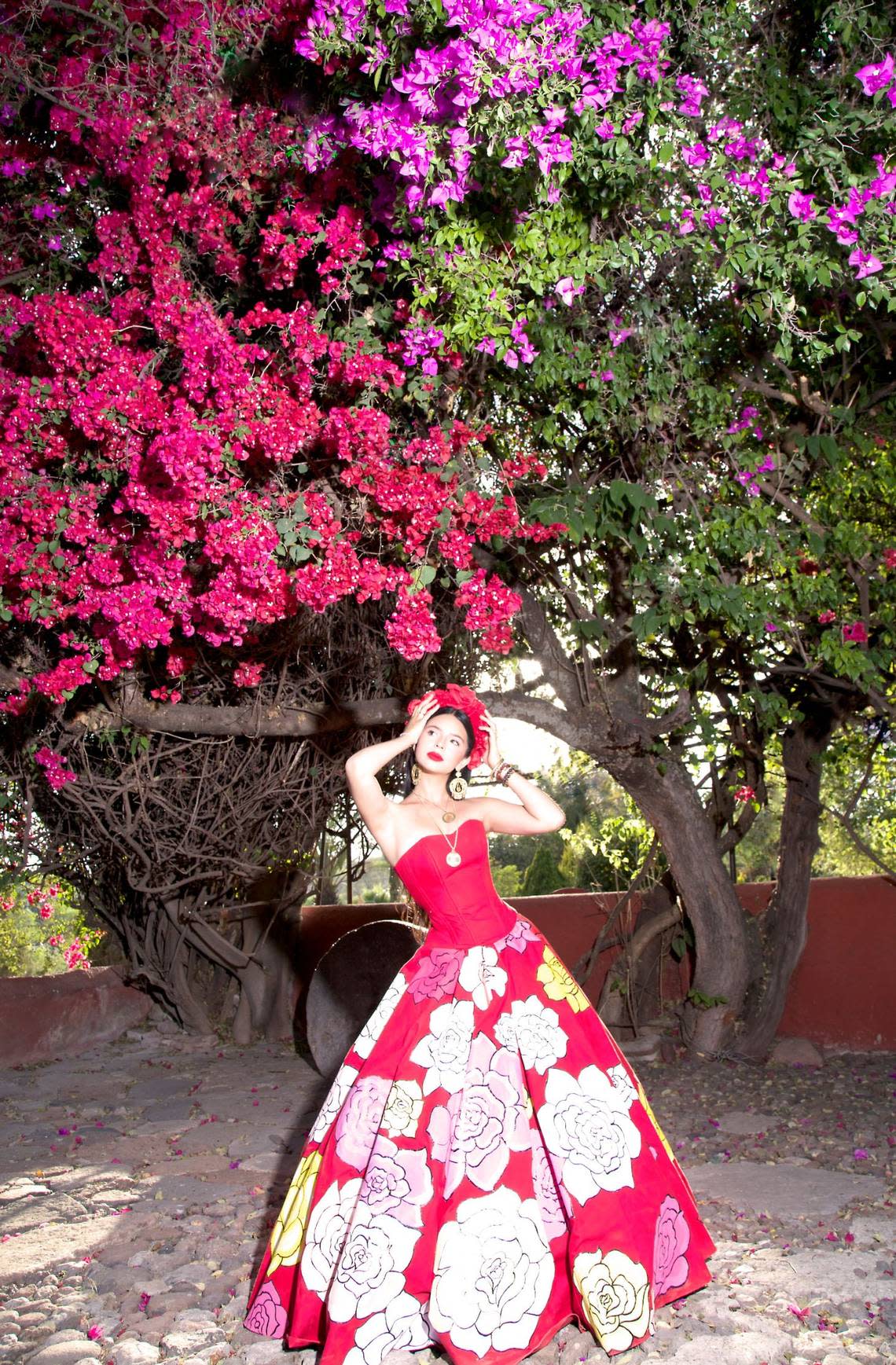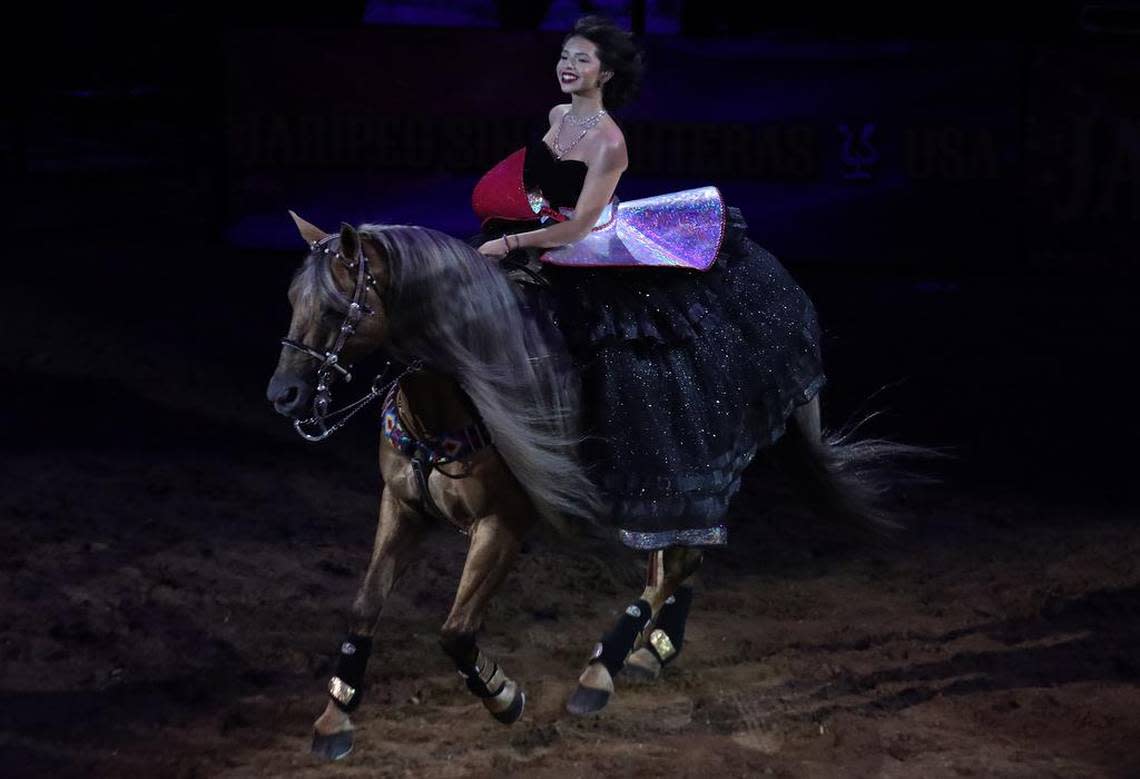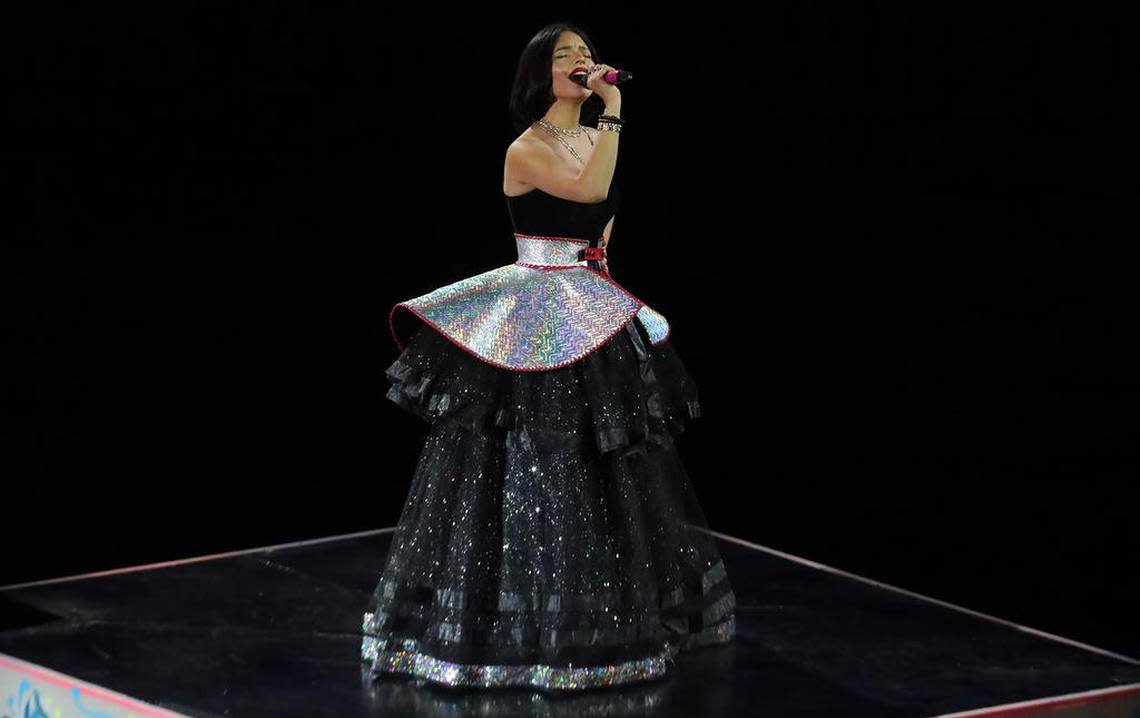The ‘princess of regional Mexican music’ is coming to California. Q+A with Ángela Aguilar
Grammy and Latin Grammy nominations. A spot on Billboard’s 21 under 21 list. A single at the top of the charts.
Mexican-American singer-songwriter Ángela Aguilar is on the rise.
But her growing success shouldn’t come as a surprise. The 18-year-old is part of the “Aguilar Dynasty.” She’s the youngest daughter of Grammy Award-winning singer, songwriter and producer, Pepe Aguilar; and granddaughter of the late Antonio Aguilar, renowned Mexican ranchera singer, songwriter, actor, producer and equestrian, and Flor Silvestre, a singer and actress during the golden age of Mexican cinema.
Born in Los Angeles and raised on her family’s rancho in the Mexican state of Zacatecas, Aguilar said she draws inspiration from her family as well as her bicultural roots. Considered the “princess of regional Mexican music,” Aguilar, 18, blends a fresh, female voice with the traditional sounds of the regional Mexican genre, or música regional mexicana.
Aguilar, alongside her father, brother and uncle, is en route to California with the Jaripeo Sin Fronteras, or Rodeo Without Borders, tour. Since 2018, the tour has delivered a spectacle of traditional Mexican music, mariachis and more, and travels to dozens of cities on both sides of the U.S.-Mexico border.
In an interview with The Fresno Bee, the Mexican-American singer-songwriter discussed her bilingual, bicultural identity, the challenges of navigating a male-dominated industry and her family’s tour. The interview, conducted in Spanglish, was edited for length and clarity.

Q: Tell us about the Jaripeo Sin Fronteras tour. What’s it like?
Jaripeo Sin Fronteras is like a Mexican circus (laughs). It’s a huge, huge, huge show, but if I can explain it in some way, it’s like a Mexican circus with amazing music.
A jaripeo is an event where bullriders mount a bull and try to last eight seconds on top. Aside from bringing bulls, we have 14 horses, our music, our dancers, production designers and our traditions from Mexico. We have people from all over involved in this espectacular, and that’s why it’s a jaripeo without borders.

Q: How can music act as a bridge between the U.S. and Mexico?
When they present me in the show, they say, “return to the country that longs for us: Mexico.”
We have 120 mostly Mexican musicians that are ganándose el pan, working, to support their families here in the U.S. They don’t return home until the tour is over in December.
Beyond the specific songs we sing, there’s an energy behind all of us: we’re all trying to provide the best for our families. We’re working to bring happiness to the people that are working for their families. We miss Mexico just as much as you guys.
I think the immigrant is one of the strongest people in the world for both the process it takes to get to the U.S. and the work they have to do. There’s nothing that Mexicans can’t do, to be honest.
So to be able to sing these songs — with the mariachi, banda, while people are having a good time, drinking tequila, just being together and meeting new people, the colors, the (Mexican) flag everywhere — it’s three hours of returning to Mexico.
La Abeja, a newsletter written for and by California Latinos
Sign up here to receive our weekly newsletter centered around Latino issues in California.
Q: What song are you most excited to perform in California?
One of my favorite songs to sing in the jaripeo is a new one (for me). It’s my grandma’s song – I literally sang it two days ago for the first time in my life. It’s called “Cachito de mi Vida.” It’s so old that the lyrics aren’t even on Google.
It brings me back to my grandma. If you notice, I’ve started all the jaripeos with one of her songs because she’s been my main inspiration since always.
Q: You were born in the U.S., but raised in Mexico. How do you define your relationship to being Americana?
I think it’s cool, man. I think being Mexican-American is kind of like a superpower because you have two countries that are supporting you and that are bringing you up.
I think it’s like a superpower to feel completely comfortable speaking Spanish, completely comfortable speaking English, and knowing the histories of both places. I feel like it’s a door to literal paradise.
There are so many Mexican authors, artists, and composers. On the other hand, there are people like Alicia Keys, Aretha Franklin (where I draw inspiration). I use a lot of harmonies and blues “runs” in my Mexican music. I get inspiration from everywhere.
Q: What’s it like to be a woman in a male-dominated industry and genre?
I think it’s extremely hard. Obviously, for me, I think being a woman is amazing and I think to be able to do justice (to the genre) as well, is like a kick in the butt to stereotypes and to machismo culture.
One of my singles, “Ahí Por Donde Me Ven,” was recently number one on the radio, and I was the first woman in 16 years in Mexican music to accomplish having a number one (on the Billboard Latin Regional Mexican charts). I mean, cool, but why? It makes no freaking sense.
For my second (solo) tour, my mom found me an all-female mariachi group. Our tour was almost all women. I’ve made a big effort to find female talent from music video directors to musical arrangers, but obviously it’s very difficult.
The thing is, it is a male-oriented genre, but we need more women in it. And this goes beyond me: I really don’t care if it’s me who’s successful. I know that there are a lot of talented, beautiful, smart, intelligent women that can be a part of this genre.
I feel very humbled to be able to live a life where my passion is also my work and is connected to my family. I don’t take it for granted – it’s definitely an honor and a privilege and it’s amazing to work with such talented people.

Q: Can you share more about the book you’re working on?
First, I started it as an exercise. My psychologist told me to write what happens in the day so that at the end of the day, you remember. Sometimes, I’d work so hard, and then I’d say, “it’s nothing, it’s nothing.”
Then she (my psychologist) would say, “you just sang in front of 50,000 people, that’s not nothing.” Absorb it, write it. Analyze it. Then, one day, on a 4-hour car ride from Zacatecas to Guadalajara, I said, ‘I’m going to start writing my story.’ It’s very crazy to analyze because it’s been a lot of work since I was little.
Writing (is) just another form of expression. I really like it.
I’m also making two albums right now, working on various clothes and shoe lines, as well as a doll. I’m constantly working. There’s so much, and I’m so grateful.
Q: What would you tell young women who want to find their passion, start their career, or carve their path?
The world needs more women in the workplace. Women (are more likely to) give other women more opportunities, not only because they’re women, but because they’re super talented.
If you have a passion, go for it, if you have a goal, go for it. Nothing happens overnight. I’ve been working since I was four years old. I used to study music like seven hours a day. This didn’t happen overnight. It might look like it did, but it’s been everyday work.
Nothing is out of reach. It doesn’t matter where you stand economically, where you stand socially, where you are physically, nothing is out of reach.
Jaripeo Sin Fronteras tour dates
Friday, August 26, 8:00 pm
Golden 1 Center, Sacramento, CA
Sunday, September 4, 8:00 pm
Save Mart Center, Fresno, CA
